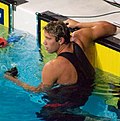Contents
- Events
- Schedule
- Qualification
- Swimming – individual events
- Swimming – relay events
- Open-water swimming
- Participating nations
- Medal table
- Results
- Men's events
- Women's events
- Olympic and world records broken
- Men
- Women
- Controversies
- Gallery of the medalists
- References
- External links
| Swimming at the Games of the XXX Olympiad | |
|---|---|
 | |
| Venue | Aquatics Centre (pool) Hyde Park (open water) |
| Dates | 28 July – 4 August 2012 (pool) 9–10 August 2012 (open water) |
| Competitors | 900 (pool), 50 (open water) from 166 nations |
| Swimming at the 2012 Summer Olympics | ||
|---|---|---|
 | ||
| Qualification | ||
| Freestyle | ||
| 50 m | men | women |
| 100 m | men | women |
| 200 m | men | women |
| 400 m | men | women |
| 800 m | women | |
| 1500 m | men | |
| Backstroke | ||
| 100 m | men | women |
| 200 m | men | women |
| Breaststroke | ||
| 100 m | men | women |
| 200 m | men | women |
| Butterfly | ||
| 100 m | men | women |
| 200 m | men | women |
| Individual medley | ||
| 200 m | men | women |
| 400 m | men | women |
| Freestyle relay | ||
| 4 × 100 m | men | women |
| 4 × 200 m | men | women |
| Medley relay | ||
| 4 × 100 m | men | women |
| Marathon | ||
| 10 km | men | women |
The swimming competitions at the 2012 Summer Olympics in London took place from 28 July to 4 August at the Aquatics Centre. [1] The open-water competition took place from 9 to 10 August in Hyde Park. [2]
Swimming featured 34 events (17 male, 17 female), including two 10 km open-water marathons in Hyde Park's Serpentine Lake. The remaining 32 were contested in a 50 m long course pool within the Olympic Park.
The United States claimed a total of 31 medals (16 golds, 9 silver, and 6 bronze) in the leaderboard to maintain its supremacy as the most successful nation in swimming. [3] Brought by an unprecedented sporting domination, Michael Phelps emerged as the most decorated Olympian of all time after winning six more medals at these Games to bring his total after the 2012 games to 22 (18 golds, 2 silver, and 2 bronze). [4] Battling against the Americans for an overall medal count, China mounted to an unexpected second-place effort on the leaderboard with a tally of 10 medals (five golds, three silver, and bronze) after striking a superb double from Sun Yang in long-distance freestyle (both 400 and 1500 m) and Ye Shiwen in the individual medley (both 200 and 400 m). [5] Meanwhile, France ended on a spectacular fashion in third spot with a total of seven medals (four golds, two silver, and one bronze), followed by the Netherlands with four, including two golds from Ranomi Kromowidjojo in sprint freestyle (both 50 and 100 m), and South Africa with three. [3]
For the first time since 1992, Australia delivered an underwhelming performance with only a single triumph in the freestyle relay, but managed to bring home a total of ten medals. [6] After not winning a gold in swimming since 2000, Japan produced the most medals in the post-war era to build a tally of eleven (three silver and eight bronze). [7]
A total of nine world records and twenty five Olympic records were set during the competition.















